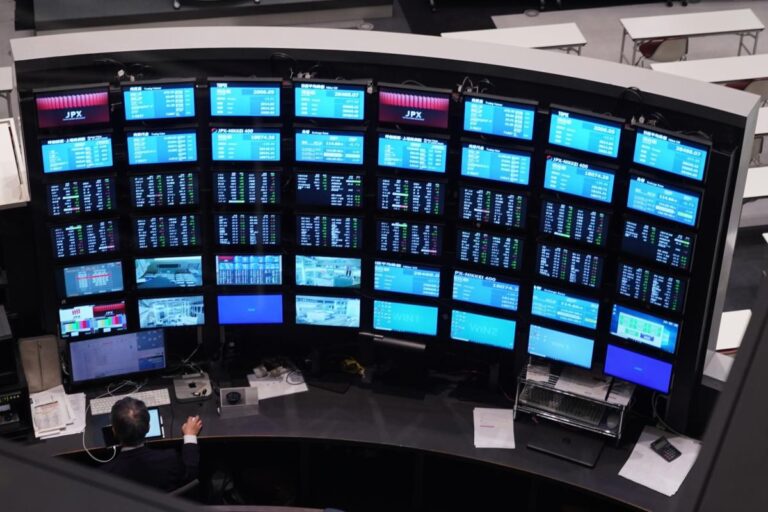
[ad_1]
(Bloomberg) — Risk-off sentiment returned to markets on Thursday as concern about inflation and the risk of global recession overshadowed the Bank of England’s move to restore calm.
Most Read from Bloomberg
The pound snapped a two-day gain and UK gilt yields rose as Prime Minister Liz Truss defended a giant package of unfunded tax cuts that sent markets into turmoil. The dollar climbed versus all of its Group-of-10 peers and Treasuries slumped as investors focused on expectations the Federal Reserve will continue to deliver aggressive interest-rate hikes.
European bond yields also rose as investors digested the latest inflation data and commentary from European Central Bank officials, while Germany’s leading research institutes said the region’s biggest economy will likely contract by 0.4% next year due to the impact of the energy crisis. Euro-area economic confidence dropped to the lowest since 2020.
Stocks and US futures fell, as Hong Kong’s Hang Seng Tech Index touched its lowest since inception. European stocks are extending a selloff that has caused valuations to drop to their lowest since 2012 and well below the average of the past decade.
“Other than the dollar, there are not many assets that are trading constructively,” said Julia Raiskin, Asia-Pacific head of markets for Citigroup Inc. “The markets are very pessimistic. Investors are fairly on the sidelines.”
Former Bank of England Governor Mark Carney accused the UK government of “undercutting” the nation’s economic institutions, and said that its fiscal plans were to blame for the drop in the pound and bonds. His comments are the latest in a string of international criticism and warnings, including from the International Monetary Fund and ratings firm Moody’s Investors Service.
Simon Wolfson, the boss of Next Plc and a Conservative peer, also appeared to blame the Tory government for a crash in the pound and a worsening outlook for UK inflation, which the company cited, as it lowered guidance for sales and profits.
Next’s shares fell as much as 9.8% in London and an index of retailers plunged to the lowest in a decade. In other notable moves, Porsche AG rose after the largest initial public offering in Europe in more than a decade.
Investors are contending with threats posed by discordant moves from central banks over the past few days, with Fed officials adamant on further monetary tightening, the BOE unveiling a £65 billion ($71 billion) plan to support government debt and authorities in Asia trying to prop up weakening currencies.
“The central bank is in a very difficult position right now,” Julie Biel, Kayne Anderson Rudnick portfolio manager and senior research analyst, said of the BOE in an interview with Bloomberg TV. “Everyone has been a little bit backed into a corner in seeing the volatility and market reaction.”
Fed officials continued to hammer home the central bank’s hawkish outlook, with Atlanta President Raphael Bostic saying he backs raising rates by a further 1.25 percentage points by the end of this year. Meanwhile, the People’s Bank of China said it will accelerate usage of targeted loans to ensure deliveries of property projects and will increase such loans when needed.
In other news, the Swedish Coast Guard’s Command Center identified a new pipeline leak in the Baltic Sea. European Commission President Ursula von der Leyen announced an eighth package of sanctions to target Russia over its attempt to annex more territory in Ukraine. The measures will include a price cap on Russian oil exports.
How much damage is a strong dollar causing? That’s the theme of this week’s MLIV Pulse survey. It’s brief and we don’t collect your name or any contact information. Please click here to share your views.
Key events this week:
-
US initial jobless claims, GDP, Thursday
-
Fed’s Loretta Mester, Mary Daly speak at events, Thursday
-
China PMI, Friday
-
Euro zone CPI, unemployment, Friday
-
US consumer income , University of Michigan consumer sentiment, Friday
-
Fed’s Lael Brainard and John Williams speak, Friday
Some of the main moves in markets:
Stocks
-
The Stoxx Europe 600 fell 1.5% as of 10:05 a.m. London time
-
Futures on the S&P 500 fell 1.1%
-
Futures on the Nasdaq 100 fell 1.3%
-
Futures on the Dow Jones Industrial Average fell 1%
-
The MSCI Asia Pacific Index fell 1.7%
-
The MSCI Emerging Markets Index fell 1.8%
Currencies
-
The Bloomberg Dollar Spot Index rose 0.6%
-
The euro fell 0.7% to $0.9671
-
The Japanese yen fell 0.4% to 144.72 per dollar
-
The offshore yuan fell 0.5% to 7.2010 per dollar
-
The British pound fell 0.7% to $1.0808
Cryptocurrencies
-
Bitcoin fell 1% to $19,377.95
-
Ether fell 1.8% to $1,326.33
Bonds
-
The yield on 10-year Treasuries advanced 11 basis points to 3.84%
-
Germany’s 10-year yield advanced 14 basis points to 2.26%
-
Britain’s 10-year yield advanced 13 basis points to 4.14%
Commodities
-
Brent crude fell 1.5% to $87.94 a barrel
-
Spot gold fell 0.9% to $1,645.27 an ounce
Most Read from Bloomberg Businessweek
©2022 Bloomberg L.P.
[ad_2]